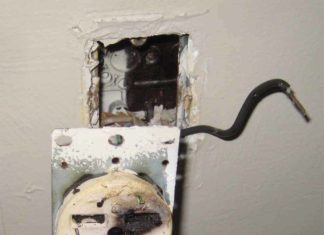Tag: Portable GFCI
Effects of Electricity on the Human Body
Dear Mr. Electrician: What are the effects of electricity on the human body?
Answer: Below is a chart that was compiled many years ago of the effects of electricity on the human body. It explains the effects of electricity on the human body when receiving electrical shocks of different intensities. Do not try this yourself or on other people.
Table of Contents:
Effects of Electricity On Humans
Protect Against Electrocution
Boating Hazards
Swimming Pool Electrical Hazards
NOTE: Some text links below go to applicable products on EBay or Amazon. As an Amazon Associate, I earn from qualifying purchases. Using my links helps to keep this website FREE.
EFFECTS OF ELECTRICITY ON THE HUMAN BODY
Amount
of Electrical Current
Reaction to
the Human Body
Below 1 milliampere
Generally not perceptible
1 milliampere
Faint tingle
5 milliamperes
Slight shock felt; not painful but disturbing. Average individual can let go. Strong involuntary reactions can lead to other injuries.
6–25 milliamperes (women)
Painful shock, loss of muscular control*
9–30 milliamperes (men)
The freezing current or "let-go" range.*
Individual cannot let go, but can be thrown away from the circuit if extensor muscles are stimulated.
50–150 milliamperes
Extreme pain, respiratory arrest, severe muscular contractions. Death is possible.
1,000–4,300 milliamperes
Rhythmic pumping action of the heart ceases. Muscular contraction and nerve damage occur; death likely.
10,000 milliamperes
Cardiac arrest, severe burns; death probable.
* If the extensor muscles are excited by the shock, the person may be thrown away from the power source.
NOTE: 1000 milliamperes equals one ampere which is approximately the amount of current that flows through a 120 watt light bulb at 120 volts.
Source: W.B. Kouwenhoven, "Human Safety and Electric Shock," Electrical Safety Practices, Monograph, 112, Instrument Society of America, p. 93. November 1968.
Top Of Page
Below is a tragic story of a girl who got electrocuted in the bathtub. Please do not use extension cords in the bathroom. I was on a repair call for a bathroom fan once when I noticed that my older client had an electric heater next to his bathtub. It was plugged into a GFCI outlet with an extension cord.
In addition to an electrical hazard, the extension cord on the floor was a tripping hazard. I tried to explain the effects of electricity on the human body from that potential electrical hazard and even wrote it out on my bill, but I think it was more important to him to have heat when he got out of the shower.
PROTECTION AGAINST ELECTROCUTION
GFCI-protected electrical outlets are required in basements, bathrooms, garages, outdoors, service outlets, kitchens, swimming pools, and appliances and for equipment such as air conditioning, electric clothes dryers, and electric stoves. Read article 210.8 in the National Electrical Code Book (NFPA 70).
Following some common-sense guidelines, you can protect yourself from electrical shock and electrocution. When working or playing outdoors and using electricity, be sure everything is plugged into GFCI receptacles. GFCI receptacles and circuit breakers are designed to shut off power if there is a current imbalance of more than five milliamperes. They are designed to save lives.
If you work outdoors regularly using power tools, you should get a portable GFCI. A portable GFCI is...
